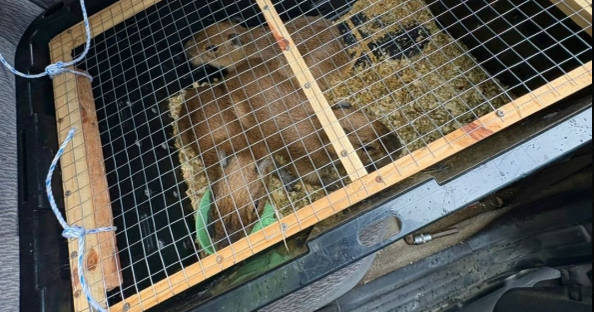
Costa Rica Police Pursuit Concludes with Confiscation of Cocaine, Marijuana, Knives, and Five Giant Aquatic Rodents
Costa Rican Police Uncover Unusual Drug Bust Involving Capybaras
In a surprising twist on the usual drug bust narrative, Costa Rican authorities seized crack cocaine, marijuana, and five capybaras after a high-speed chase along the Pacific coast. The operation unfolded on Thursday, leaving many to wonder about the intersection of drug trafficking and wildlife smuggling.
The capybaras, which are the world’s largest rodents and relatives of guinea pigs, have gained popularity on social media platforms. Despite their growing fame, these semi-aquatic creatures are not native to Costa Rica. The Public Security Ministry emphasized that possessing or transporting these animals is illegal, making this seizure particularly notable. “This is the first recorded case of illegal capybara trafficking in Costa Rica,” stated the ministry in their report.
Authorities released a video showcasing the unusual scene: capybaras being carefully loaded into crates for transportation. It’s not every day you see a creature more commonly associated with tranquil South American waterways being caught up in the dark underworld of drug smuggling.
The two men apprehended in the vehicle were already known to law enforcement due to their criminal records. Their latest escapade adds another chapter to their troubled history. “The police action was important and shows the concurrence where the drug world coincides with the introduction of non-native species,” said Security Minister Mario Zamora, highlighting a curious overlap of illegal activities.
Beyond drugs and animals, knives and plastic spurs were also confiscated during the operation. These additional items suggest a potentially broader scope of criminal intent.
The capybaras have been handed over to Costa Rica’s National System of Conservation Areas for veterinary evaluation. Given their status as non-native species, they cannot be released into the wild within Costa Rica. Instead, they will be integrated into conservation education programs at designated refuges.
This peculiar case comes on the heels of another unusual incident in Costa Rica: prison guards recently intercepted a drug-smuggling cat. The feline had marijuana and crack taped to its body as it attempted to scale a prison fence under cover of darkness.
For those unfamiliar with these intriguing creatures, the World Wildlife Fund notes that capybaras typically weigh about 108 pounds-comparable in size to an adult wolf. With webbed feet and nostrils positioned on top of their heads, they are well-adapted swimmers capable of staying submerged for extended periods.
This incident is more than just an unusual footnote in crime reports; it’s a reminder of how diverse and unpredictable illegal activities can be-and how far-reaching their consequences might stretch.
For more details, see this background on crime trends.



